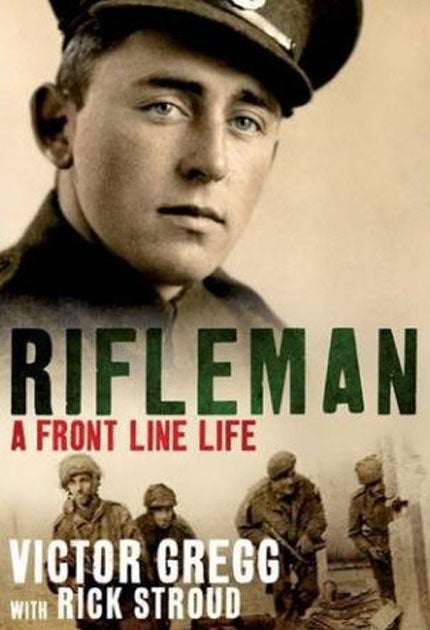Rifleman: A Front-Line Life, By Victor Gregg with Rick Stroud
A born survivor’s gripping tale

Your support helps us to tell the story
From reproductive rights to climate change to Big Tech, The Independent is on the ground when the story is developing. Whether it's investigating the financials of Elon Musk's pro-Trump PAC or producing our latest documentary, 'The A Word', which shines a light on the American women fighting for reproductive rights, we know how important it is to parse out the facts from the messaging.
At such a critical moment in US history, we need reporters on the ground. Your donation allows us to keep sending journalists to speak to both sides of the story.
The Independent is trusted by Americans across the entire political spectrum. And unlike many other quality news outlets, we choose not to lock Americans out of our reporting and analysis with paywalls. We believe quality journalism should be available to everyone, paid for by those who can afford it.
Your support makes all the difference.In 1944, Victor Gregg, a paratrooper with the Allied forces, was captured by the Germans at the Battle of Arnhem. His platoon, reduced to three men, had run out of ammunition and were holding back the enemy by pelting them with stones. He was imprisoned at Limberg, where discipline was enforced by spraying captives with excrement, then moved to a work camp in a Dresden suburb. He twice attempted escape, and was sentenced to death when he sabotaged a soap factory by putting cement powder in the mix. The factory burnt to the ground, presaging the bombing of Dresden, which saved Gregg's life as his cell was destroyed and he was able to scramble free into the hell of the burning city.
Gregg, now 91, is a survivor. A pugnacious and reckless youth growing up in working-class north London, he joined the Rifle Brigade in 1937 on a whim. When war was declared, these street-smart lads understood the laws of engagement and dark arts of survival. In the Middle East, outnumbered 10 to one, they scavenged the eight Browning machine guns from a crashed Hurricane, trebling their firepower. Fighting was fierce and close, and they learnt the darkest art of all – how to kill with their bare hands. The infantry were supplied with Benzedrine tablets to keep alert during the horror of Arnhem. Their after-effects were a searing, intense sensitivity to the carnage before them.
Gregg's description of the bombing of Dresden is possibly one of the most shocking accounts of warfare you will ever read. Incendiary bombs drop burning sulphur on his comrades' bodies, and he watches as they burn to death. The 5,000 civilians trapped in an underground shelter are slowly incinerated as the relentless heat melts road surfaces and boils the water from burst mains. Dresden made Gregg feel like a murderer.
Escaping to the Russian side, he is eventually transported back to England where he is held under suspicion of consorting with the new enemy, communist Russia. After the war, he joins the Communist Party, then becomes a double agent working for MI6. As the Cold War thawed, information he supplied to activist friends played a small part in bringing down the Berlin Wall. Victor Gregg's memoir is a gripping life-story: an incident-packed account of heartache, violence and cunning by a man whose will to survive and unbreakable optimism are a true inspiration.
Join our commenting forum
Join thought-provoking conversations, follow other Independent readers and see their replies
Comments